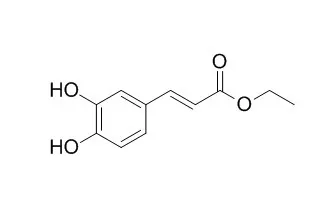| In vitro: |
| Chem Biol Interact. 2014 Aug 5;219:151-8. | | A mechanistic study on the anti-cancer activity of ethyl caffeate in human ovarian cancer SKOV-3 cells.[Pubmed: 24892518 ] | In the present study, we investigated the effect and molecular mechanism of Ethyl caffeate (EC), a natural phenolic compound isolated from Ligularia fischeri, on human ovarian cancer cell proliferation and progression.
METHODS AND RESULTS:
EC-mediated inhibition of cell proliferation in SKOV-3 cells was accompanied by reduced expression of cell cycle-related proteins such as cyclin-dependent kinases and cyclins, resulting in pRb hypophosphorylation and G₁ phase cell cycle arrest. Moreover, EC treatment markedly inhibited cell migration and invasion. These regulatory effects of EC on ovarian cancer cell proliferation, migration and invasion were associated with inactivation of mitogenic signaling pathways such as Akt, ERK and p38(MAPK), and down-regulation of cell surface signaling molecules including receptor tyrosine kinases, integrin α3β1 and N-cadherin.
CONCLUSIONS:
Taken together, these findings suggest further evaluation and development of EC for the treatment and prevention of ovarian cancer. | | Br J Pharmacol. 2005 Oct;146(3):352-63. | | Ethyl caffeate suppresses NF-kappaB activation and its downstream inflammatory mediators, iNOS, COX-2, and PGE2 in vitro or in mouse skin.[Pubmed: 16041399] | Ethyl caffeate, a natural phenolic compound, was isolated from Bidens pilosa, a medicinal plant popularly used for treating certain inflammatory syndromes. The purpose of this study was to investigate the structural activity, and the anti-inflammatory functions and mechanism(s) of Ethyl caffeate.
METHODS AND RESULTS:
Ethyl caffeate was found to markedly suppress the lipopolysaccharide (LPS)-induced nitric oxide (NO) production (IC(50) = 5.5 microg ml(-1)), mRNA and protein expressions of inducible nitric oxide synthase (iNOS), and prostaglandin E(2) (PGE(2)) production in RAW 264.7 macrophages. Transient gene expression assays using human cox-2 promoter construct revealed that Ethyl caffeate exerted an inhibitory effect on cox-2 transcriptional activity in 12-O-tetradecanoylphorbol-13-acetate (TPA)-treated MCF-7 cells. Immunohistochemical studies of mouse skin demonstrated that TPA-induced COX-2 expression was significantly inhibited by Ethyl caffeate with a superior effect to that of celecoxib, a nonsteroidal anti-inflammatory drug. The phosphorylation and degradation of inhibitor kappaB (IkappaB) and the translocation of nuclear transcription factor-kappaB (NF-kappaB) into the nucleus, as well as the activation of mitogen-activated protein kinases (MAPKs) induced by LPS in macrophages, were not affected by Ethyl caffeate. Ethyl caffeate, however, could inhibit NF-kappaB activation by impairing the binding of NF-kappaB to its cis-acting element. These results suggest that Ethyl caffeate suppresses iNOS and COX-2 expressions partly through the inhibition of the NF-kappaB.DNA complex formation. Structure-activity relationship analyses suggested that the catechol moiety and alpha,beta-unsaturated ester group in Ethyl caffeate are important and essential structural features for preventing NF-kappaB.DNA complex formation.
CONCLUSIONS:
This study provides an insight into the probable mechanism(s) underlying the anti-inflammatory and therapeutic properties of Ethyl caffeate. |
|






 Cell. 2018 Jan 11;172(1-2):249-261.e12. doi: 10.1016/j.cell.2017.12.019.IF=36.216(2019)
Cell. 2018 Jan 11;172(1-2):249-261.e12. doi: 10.1016/j.cell.2017.12.019.IF=36.216(2019) Cell Metab. 2020 Mar 3;31(3):534-548.e5. doi: 10.1016/j.cmet.2020.01.002.IF=22.415(2019)
Cell Metab. 2020 Mar 3;31(3):534-548.e5. doi: 10.1016/j.cmet.2020.01.002.IF=22.415(2019) Mol Cell. 2017 Nov 16;68(4):673-685.e6. doi: 10.1016/j.molcel.2017.10.022.IF=14.548(2019)
Mol Cell. 2017 Nov 16;68(4):673-685.e6. doi: 10.1016/j.molcel.2017.10.022.IF=14.548(2019)